Unit 9 I like music that I can dance to. Section B (2a-2e)课件2022-2023学年人教版九年级英语全册(共24张PPT,内嵌音频)
文档属性
| 名称 | Unit 9 I like music that I can dance to. Section B (2a-2e)课件2022-2023学年人教版九年级英语全册(共24张PPT,内嵌音频) | 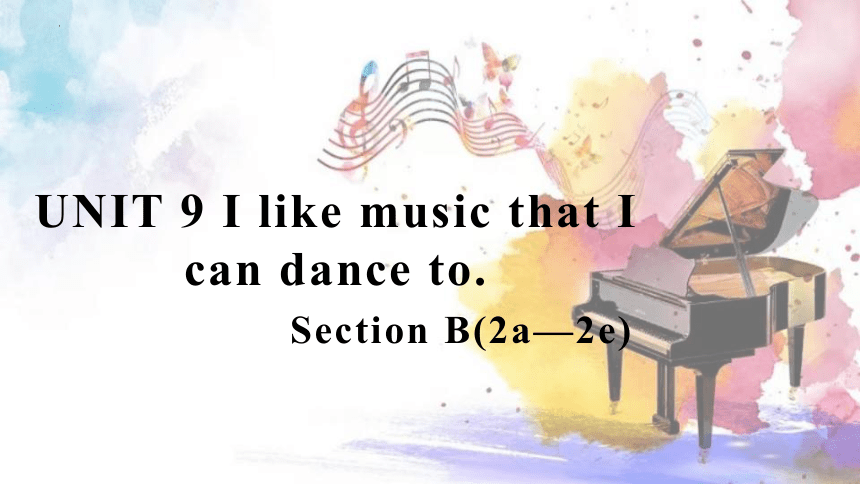 | |
| 格式 | pptx | ||
| 文件大小 | 23.6MB | ||
| 资源类型 | 教案 | ||
| 版本资源 | 人教新目标(Go for it)版 | ||
| 科目 | 英语 | ||
| 更新时间 | 2022-12-07 18:21:46 | ||
图片预览

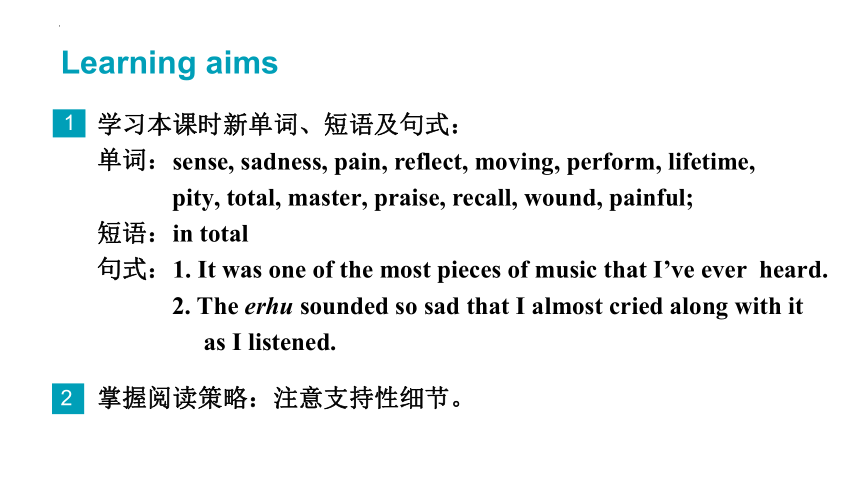
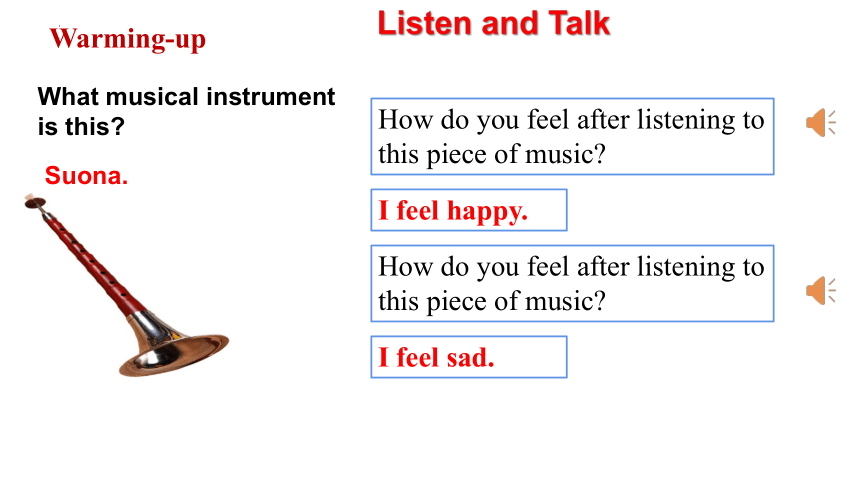
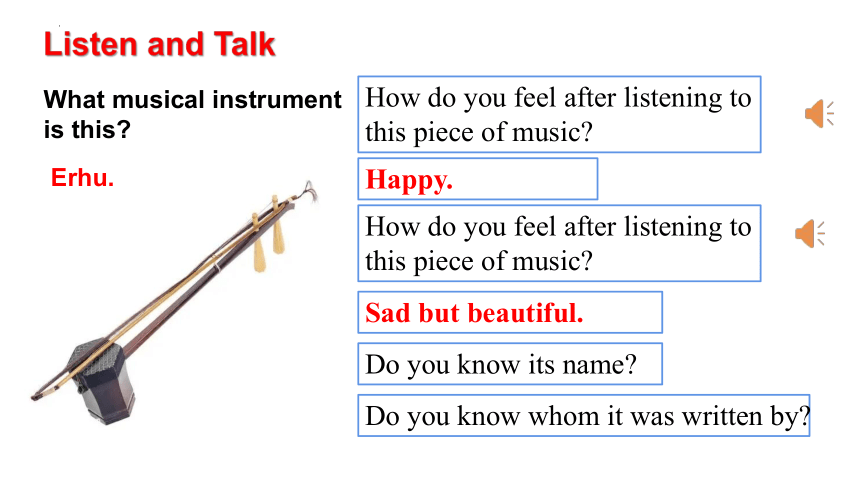
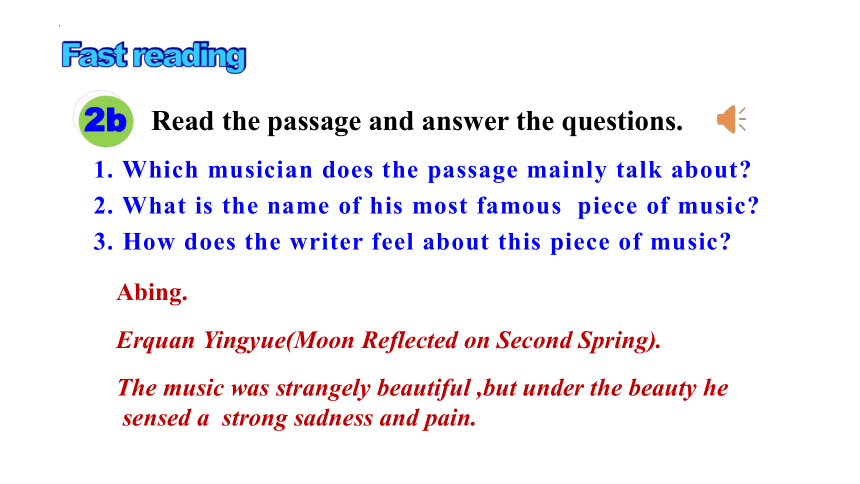
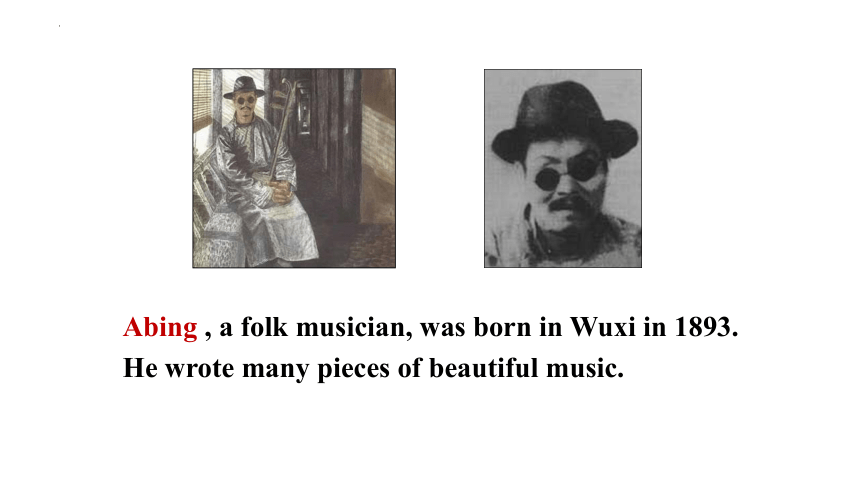
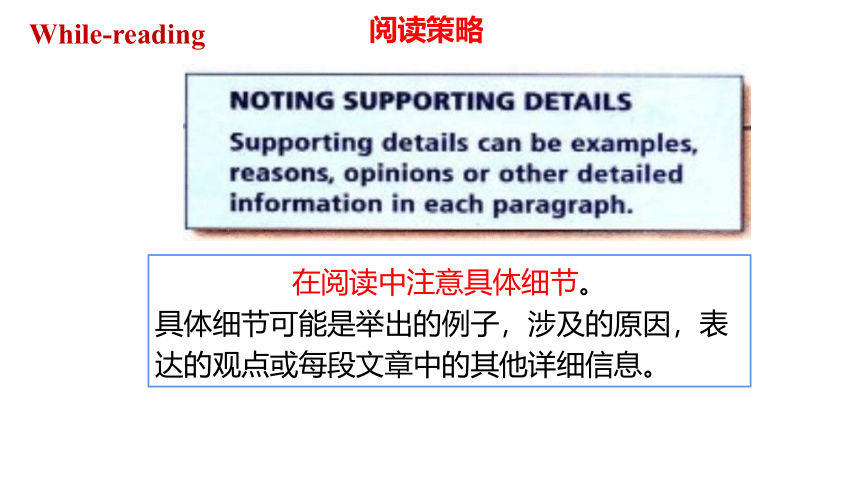
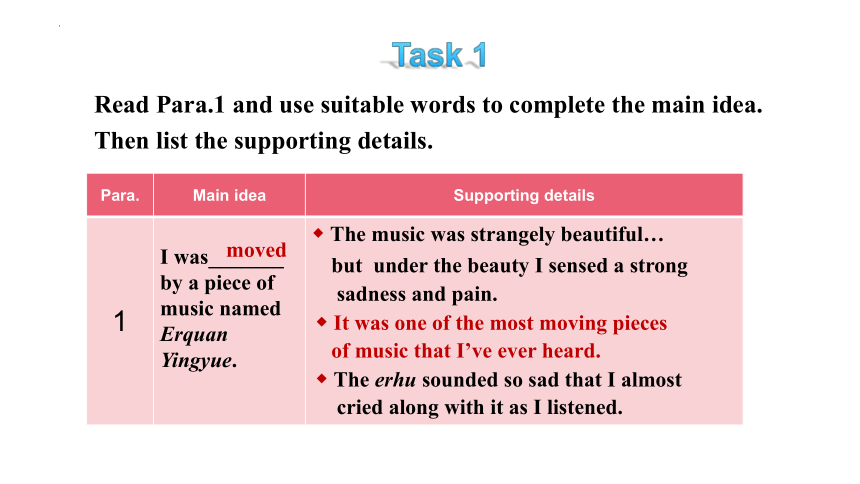
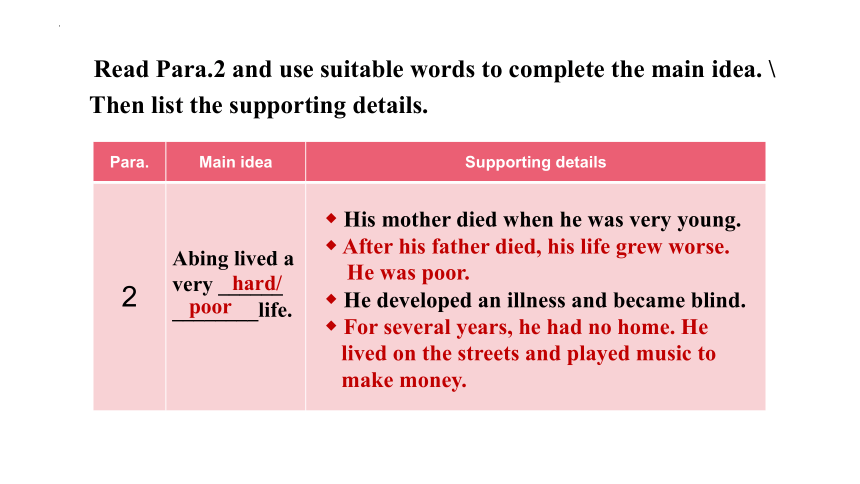
文档简介
(共24张PPT)
UNIT 9 I like music that I can dance to.
Section B(2a—2e)
Learning aims
学习本课时新单词、短语及句式:
单词:sense, sadness, pain, reflect, moving, perform, lifetime,
pity, total, master, praise, recall, wound, painful;
短语:in total
句式:1. It was one of the most pieces of music that I’ve ever heard.
2. The erhu sounded so sad that I almost cried along with it
as I listened.
1
2
掌握阅读策略:注意支持性细节。
Warming-up
I feel happy.
How do you feel after listening to this piece of music
I feel sad.
How do you feel after listening to this piece of music
What musical instrument is this
Suona.
Listen and Talk
What musical instrument is this
Erhu.
Happy.
How do you feel after listening to this piece of music
Sad but beautiful.
How do you feel after listening to this piece of music
Do you know its name
Do you know whom it was written by
Listen and Talk
Fast reading
2b
Read the passage and answer the questions.
1. Which musician does the passage mainly talk about
2. What is the name of his most famous piece of music
3. How does the writer feel about this piece of music
Abing.
Erquan Yingyue(Moon Reflected on Second Spring).
The music was strangely beautiful ,but under the beauty he
sensed a strong sadness and pain.
Abing , a folk musician, was born in Wuxi in 1893.
He wrote many pieces of beautiful music.
While-reading
在阅读中注意具体细节。
具体细节可能是举出的例子,涉及的原因,表达的观点或每段文章中的其他详细信息。
阅读策略
Task 1
Read Para.1 and use suitable words to complete the main idea.
Then list the supporting details.
Para. Main idea Supporting details
1 I was_______ by a piece of music named Erquan Yingyue. ◆ The music was strangely beautiful…
but under the beauty I sensed a strong
sadness and pain.
◆ It was one of the most moving pieces
of music that I’ve ever heard.
◆ The erhu sounded so sad that I almost
cried along with it as I listened.
moved
Read Para.2 and use suitable words to complete the main idea. \
Then list the supporting details.
Para. Main idea Supporting details
2 Abing lived a very ______ ________life.
hard/
poor
◆ His mother died when he was very young.
◆ After his father died, his life grew worse.
He was poor.
◆ He developed an illness and became blind.
◆ For several years, he had no home. He
lived on the streets and played music to
make money.
Read Para.3 and use suitable words to complete the main idea.
Then list the supporting details.
Para. Main idea Supporting details
3 Abing’s musical skills made him very _______.
popular
◆ He could play over 600 pieces of music,
and he wrote many of them himself.
◆ His most famous piece is still played
and praised by erhu masters today.
◆ Erquan Yingyue has become one of
China’s national treasures.
Task 2
2d
Read again, circle that or who and fill in the blanks with the words
in the box.
pain wounds sense pity praise
Abing played music (that/who) could touch the hearts of people. When we listen to his music, we can ______ both the beauty and the sadness in it. It makes us think about the ________ and ________
(that/who) we have experienced in the past. For this reason, many people _______ him as the musician who has greatly influenced erhu music. So it is really a ______ that not many pieces of his music were recorded.
sense
pain
wounds
praise
pity
Sad but Beautiful
Last night one of my Chinese friends took me to a concert of Chinese folk music.The piece which was played on the erhu especially moved me. The music was strangely beautiful, but under the beauty I sensed a strong sadness and pain. The piece had a simple name,Erquan Yingyue (Moon Reflected on Second Spring), but it was one of the most moving pieces of music that I've ever heard. The erhu sounded so sad that I almost cried along with it as I listened. Later I looked up the history of Erquan Yingyue, andI began to understand the sadness in the music.
Careful reading
move作为及物动词,意为 “打动;感动”
move 还可以意为“移动;搬动”
常用短语 “move to” 搬到某地。
piece表示音乐作品,相当于汉语的“一首歌;一支乐曲”等。
sense v. 感觉到, 意识到 拓展 n. 意识,感觉
e.g. People have five senses, sight, hearing, smell, taste, and touch.
cry along with...跟着...哭
look up (在字典,参考书中,通过电脑)查阅,抬头看
The music was written by Abing, a folk musician who was born in the city of Wuxi in1893.His mother died when he was very young. Abing's father taught him to play many musical instruments, such as the drums,dizi and erhu, and by age 17, Abing was known for his musical ability. However, after his father died, Abing's life grew worse.He was very poor. Not only that, he developed a serious illness and became blind.For several years, he had no home. He lived on the streets and played music to make money. Even after Abing got married and had a home again, he continued to sing and play on the streets. He performed in this way for many years.
无锡市
by age 17 到17岁
at the age of 17 在17岁
继续做某事
in this way 用这个办法;以这种方式
【拓展】in the way 阻碍,挡道
on the way to ...在去...的路上
to do不定式作目的状语
Abing's amazing musical skills made him very popular during his lifetime. By the end of his life,he could play over 600 pieces of music. Many of these were written by Abing himself. It is a pity that only six pieces of music in total were recorded for the future world to hear, but his popularity continues to this day. Today, Abing's Erquan Yingyue is a piece which all the great erhu masters play and praise. It has become one of China's national treasures. Its sad beauty not only paints a picture of Abing's own life but also makes people recall their deepest wounds from their own sad or painful experiences.
It’s a pity that +从句,为保持句子平衡,常用it 作形式主语,that 引导的从句后置才为真正的主语。
It’s pity that you missed the beginning of the movie.
很遗憾你错过了电影的开头。
in total 总共;合计
e.g. In total over 100 people attended the conference.
共计有百余人参加了这个会议。
Summary
Master the new words and expressions in the passage.
2. Relative clauses.
3. Learn the reading stratagem: Noting supporting details.
1.用二胡演奏……
2.最感人的乐曲之一
3.查阅
4.民间音乐家
5.教某人做某事
6.因……而出名
7.患严重的疾病
8.赚钱
9.结婚
play…on the erhu
one of the most moving pieces of music
look up
folk musician
teach sb. to do sth.
be known for
develop a serious illness
make money
get married
10.用这种方式
11.在某人的一生中
12.到……末为止
13.总共,合计
14.国家瑰宝
15.不仅……还……
16.如此……以至于……
17.使某人……
18.使某人做某事
19……真是遗憾
during one’s lifetime
by the end of…
in total
national treasure
not only…but also…
make sb.+形容词
in this way
so…that…
make sb. do sth.
It’s a pity that…
Conversation
2e
Student A is a foreign visitor who is interested in Abing and his music. Student B is a Chinese student who knows about Abing. Use the information in the passage to make a conversation.
A:What kind of musical instruments did Abing play
B:He could play many instruments, but he is best known
for playing the erhu.
Questions:
When and where was Abing born
What do you think of Erquan Yingyue
How was Abing’s life
How many pieces of music could Abing play by the end of his life
What was Abing famous for
…
Sample
Exercise
Ⅰ.单项选择
1. Tom will be able to find the hotel, he has a pretty good of direction.
A. idea B. feeling C. experience D. sense
2.—Let’s go for a picnic on Saturday, James.
— I have to do my homework at home.
A. What a pity! B. Don’t worry. C. Best wishes. D. How come
3. The artist received high ________ from the art community for these sculptures.
A. praise B. prize C. price D. pride
A
A
D
Ⅱ.根据句意及提示,写出正确的单词。
1. He sensed her deep _________(sad).
2. The old man has many ________(move) experiences.
3. I don’t want to recall the ___________(pain) memory.
4.His face was r__________ in the mirror.
5.The nurse is cleaning the __________(伤口)carefully。
6.The children _________(表演) two plays each school year.
sadness
moving
painful
eflected
wound
perform
Ⅲ.根据汉语意思完成英语句子,每空一词。
1.我一生中去过那里三次。
I have been there for three times _______ ____ _______.
2. 那儿总共大约有40人。
There’re about 40 people there __ _____.
3.他们去年结的婚。
They_____ ________ last year.
4. 他没有接受那份工作真是遗憾。
___ __ _____ that he didn’t accept the job.
in total
during the lifetime
got married
It’s a pity
Homework
Revise the new words and phrases in the passage in 2b.
2. Revise the relative clauses.
Thank you !
UNIT 9 I like music that I can dance to.
Section B(2a—2e)
Learning aims
学习本课时新单词、短语及句式:
单词:sense, sadness, pain, reflect, moving, perform, lifetime,
pity, total, master, praise, recall, wound, painful;
短语:in total
句式:1. It was one of the most pieces of music that I’ve ever heard.
2. The erhu sounded so sad that I almost cried along with it
as I listened.
1
2
掌握阅读策略:注意支持性细节。
Warming-up
I feel happy.
How do you feel after listening to this piece of music
I feel sad.
How do you feel after listening to this piece of music
What musical instrument is this
Suona.
Listen and Talk
What musical instrument is this
Erhu.
Happy.
How do you feel after listening to this piece of music
Sad but beautiful.
How do you feel after listening to this piece of music
Do you know its name
Do you know whom it was written by
Listen and Talk
Fast reading
2b
Read the passage and answer the questions.
1. Which musician does the passage mainly talk about
2. What is the name of his most famous piece of music
3. How does the writer feel about this piece of music
Abing.
Erquan Yingyue(Moon Reflected on Second Spring).
The music was strangely beautiful ,but under the beauty he
sensed a strong sadness and pain.
Abing , a folk musician, was born in Wuxi in 1893.
He wrote many pieces of beautiful music.
While-reading
在阅读中注意具体细节。
具体细节可能是举出的例子,涉及的原因,表达的观点或每段文章中的其他详细信息。
阅读策略
Task 1
Read Para.1 and use suitable words to complete the main idea.
Then list the supporting details.
Para. Main idea Supporting details
1 I was_______ by a piece of music named Erquan Yingyue. ◆ The music was strangely beautiful…
but under the beauty I sensed a strong
sadness and pain.
◆ It was one of the most moving pieces
of music that I’ve ever heard.
◆ The erhu sounded so sad that I almost
cried along with it as I listened.
moved
Read Para.2 and use suitable words to complete the main idea. \
Then list the supporting details.
Para. Main idea Supporting details
2 Abing lived a very ______ ________life.
hard/
poor
◆ His mother died when he was very young.
◆ After his father died, his life grew worse.
He was poor.
◆ He developed an illness and became blind.
◆ For several years, he had no home. He
lived on the streets and played music to
make money.
Read Para.3 and use suitable words to complete the main idea.
Then list the supporting details.
Para. Main idea Supporting details
3 Abing’s musical skills made him very _______.
popular
◆ He could play over 600 pieces of music,
and he wrote many of them himself.
◆ His most famous piece is still played
and praised by erhu masters today.
◆ Erquan Yingyue has become one of
China’s national treasures.
Task 2
2d
Read again, circle that or who and fill in the blanks with the words
in the box.
pain wounds sense pity praise
Abing played music (that/who) could touch the hearts of people. When we listen to his music, we can ______ both the beauty and the sadness in it. It makes us think about the ________ and ________
(that/who) we have experienced in the past. For this reason, many people _______ him as the musician who has greatly influenced erhu music. So it is really a ______ that not many pieces of his music were recorded.
sense
pain
wounds
praise
pity
Sad but Beautiful
Last night one of my Chinese friends took me to a concert of Chinese folk music.The piece which was played on the erhu especially moved me. The music was strangely beautiful, but under the beauty I sensed a strong sadness and pain. The piece had a simple name,Erquan Yingyue (Moon Reflected on Second Spring), but it was one of the most moving pieces of music that I've ever heard. The erhu sounded so sad that I almost cried along with it as I listened. Later I looked up the history of Erquan Yingyue, andI began to understand the sadness in the music.
Careful reading
move作为及物动词,意为 “打动;感动”
move 还可以意为“移动;搬动”
常用短语 “move to” 搬到某地。
piece表示音乐作品,相当于汉语的“一首歌;一支乐曲”等。
sense v. 感觉到, 意识到 拓展 n. 意识,感觉
e.g. People have five senses, sight, hearing, smell, taste, and touch.
cry along with...跟着...哭
look up (在字典,参考书中,通过电脑)查阅,抬头看
The music was written by Abing, a folk musician who was born in the city of Wuxi in1893.His mother died when he was very young. Abing's father taught him to play many musical instruments, such as the drums,dizi and erhu, and by age 17, Abing was known for his musical ability. However, after his father died, Abing's life grew worse.He was very poor. Not only that, he developed a serious illness and became blind.For several years, he had no home. He lived on the streets and played music to make money. Even after Abing got married and had a home again, he continued to sing and play on the streets. He performed in this way for many years.
无锡市
by age 17 到17岁
at the age of 17 在17岁
继续做某事
in this way 用这个办法;以这种方式
【拓展】in the way 阻碍,挡道
on the way to ...在去...的路上
to do不定式作目的状语
Abing's amazing musical skills made him very popular during his lifetime. By the end of his life,he could play over 600 pieces of music. Many of these were written by Abing himself. It is a pity that only six pieces of music in total were recorded for the future world to hear, but his popularity continues to this day. Today, Abing's Erquan Yingyue is a piece which all the great erhu masters play and praise. It has become one of China's national treasures. Its sad beauty not only paints a picture of Abing's own life but also makes people recall their deepest wounds from their own sad or painful experiences.
It’s a pity that +从句,为保持句子平衡,常用it 作形式主语,that 引导的从句后置才为真正的主语。
It’s pity that you missed the beginning of the movie.
很遗憾你错过了电影的开头。
in total 总共;合计
e.g. In total over 100 people attended the conference.
共计有百余人参加了这个会议。
Summary
Master the new words and expressions in the passage.
2. Relative clauses.
3. Learn the reading stratagem: Noting supporting details.
1.用二胡演奏……
2.最感人的乐曲之一
3.查阅
4.民间音乐家
5.教某人做某事
6.因……而出名
7.患严重的疾病
8.赚钱
9.结婚
play…on the erhu
one of the most moving pieces of music
look up
folk musician
teach sb. to do sth.
be known for
develop a serious illness
make money
get married
10.用这种方式
11.在某人的一生中
12.到……末为止
13.总共,合计
14.国家瑰宝
15.不仅……还……
16.如此……以至于……
17.使某人……
18.使某人做某事
19……真是遗憾
during one’s lifetime
by the end of…
in total
national treasure
not only…but also…
make sb.+形容词
in this way
so…that…
make sb. do sth.
It’s a pity that…
Conversation
2e
Student A is a foreign visitor who is interested in Abing and his music. Student B is a Chinese student who knows about Abing. Use the information in the passage to make a conversation.
A:What kind of musical instruments did Abing play
B:He could play many instruments, but he is best known
for playing the erhu.
Questions:
When and where was Abing born
What do you think of Erquan Yingyue
How was Abing’s life
How many pieces of music could Abing play by the end of his life
What was Abing famous for
…
Sample
Exercise
Ⅰ.单项选择
1. Tom will be able to find the hotel, he has a pretty good of direction.
A. idea B. feeling C. experience D. sense
2.—Let’s go for a picnic on Saturday, James.
— I have to do my homework at home.
A. What a pity! B. Don’t worry. C. Best wishes. D. How come
3. The artist received high ________ from the art community for these sculptures.
A. praise B. prize C. price D. pride
A
A
D
Ⅱ.根据句意及提示,写出正确的单词。
1. He sensed her deep _________(sad).
2. The old man has many ________(move) experiences.
3. I don’t want to recall the ___________(pain) memory.
4.His face was r__________ in the mirror.
5.The nurse is cleaning the __________(伤口)carefully。
6.The children _________(表演) two plays each school year.
sadness
moving
painful
eflected
wound
perform
Ⅲ.根据汉语意思完成英语句子,每空一词。
1.我一生中去过那里三次。
I have been there for three times _______ ____ _______.
2. 那儿总共大约有40人。
There’re about 40 people there __ _____.
3.他们去年结的婚。
They_____ ________ last year.
4. 他没有接受那份工作真是遗憾。
___ __ _____ that he didn’t accept the job.
in total
during the lifetime
got married
It’s a pity
Homework
Revise the new words and phrases in the passage in 2b.
2. Revise the relative clauses.
Thank you !
同课章节目录
- Unit 1 How can we become good learners.
- Section A
- Section B
- Unit 2 I think that mooncakes are delicious!
- Section A
- Section B
- Unit 3 Could you please tell me where the restroom
- Section A
- Section B
- Unit 4 I used to be afraid of the dark.
- Section A
- Section B
- Unit 5 What are the shirts made of?
- Section A
- Section B
- Review of Units 1-5
- Unit 6 When was it invented?
- Section A
- Section B
- Unit 7 Teenagers should be allowed to choose their
- Section A
- Section B
- Unit 8 It must belong to Carla.
- Section A
- Section B
- Unit 9 I like music that I can dance to.
- Section A
- Section B
- Unit 10 You're supposed to shake hands.
- Section A
- Section B
- Review of Units 6-10
- Unit 11 Sad movies make me cry.
- Section A
- Section B
- Unit 12 Life is full of the unexpected
- Section A
- Section B
- Unit 13 We're trying to save the earth!
- Section A
- Section B
- Unit 14 I remember meeting all of you in Grade 7.
- Section A
- Section B
- Review of Units 11-14
